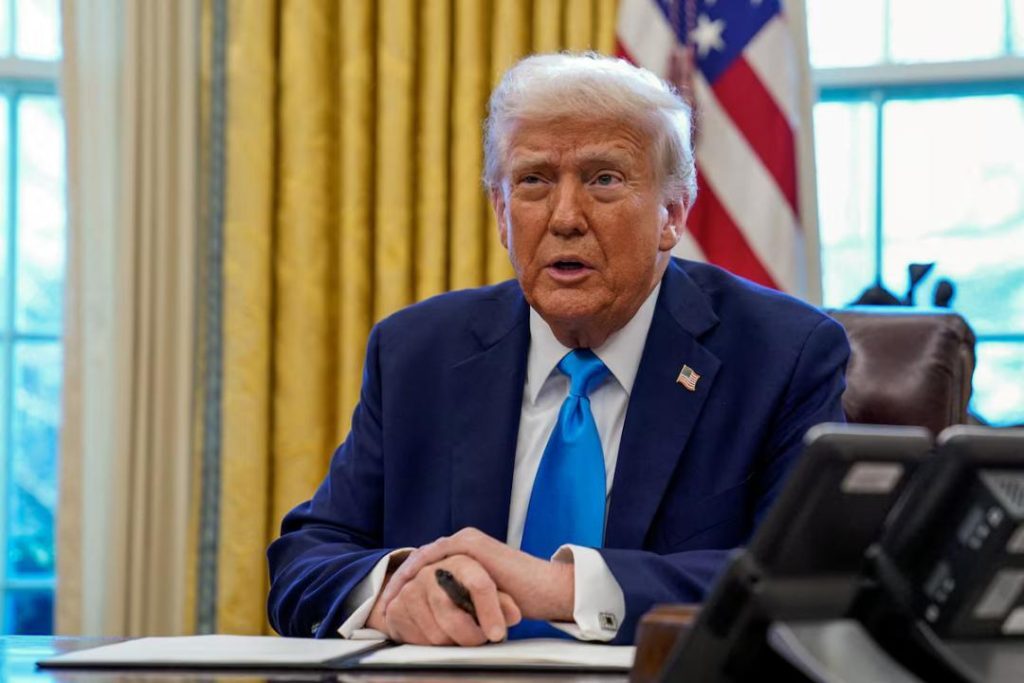
Trump Signs Order to Use Military Against Drug Cartels: Report
In a move that has sent shockwaves across the globe, US President Donald Trump has secretly signed an order directing the Pentagon to use military force against Latin American drug cartels that have been deemed terrorist organisations. According to a report by The New York Times, military officials have begun planning potential operations in response to the directive.
The news comes just days after Trump declared an emergency at the US-Mexico border, citing an influx of cartels and smugglers. However, this latest development marks a significant escalation in the administration’s efforts to combat the drug trade.
The order, which has not been publicly disclosed, reportedly authorizes the use of military force against drug cartels that have been deemed terrorist organizations. This designation has been made by the State Department, which has accused these cartels of engaging in activities that threaten US national security.
The move has raised concerns among lawmakers and human rights advocates, who have warned that using military force against drug cartels could lead to unintended consequences, including civilian casualties and human rights abuses.
“This is a catastrophic mistake,” said Senator Bob Menendez, the top Democrat on the Senate Foreign Relations Committee. “Using the military to combat drug cartels would be a recipe for disaster, and would only exacerbate the very problems we’re trying to solve.”
The New York Times report cites anonymous sources within the Pentagon and the White House, who claim that the order was signed several weeks ago. Since then, military officials have been working to develop a plan for potential operations against the drug cartels.
The cartels in question are believed to be based in Mexico and Central America, and are responsible for smuggling vast quantities of cocaine, heroin, and other drugs into the United States. The cartels have been accused of engaging in brutal violence and human rights abuses, and have been linked to numerous murders, kidnappings, and other crimes.
Despite the concerns raised by lawmakers and human rights advocates, the Trump administration has defended the move, citing the need to take decisive action against the drug cartels.
“We’re not going to let these cartels continue to wreak havoc on our country,” said a senior administration official. “We’re going to take whatever steps necessary to protect our national security and the safety of our citizens.”
The move comes amid growing tensions between the US and Mexico over issues such as trade, immigration, and security. The two countries have been engaged in a series of heated disputes, including a trade war and a crisis over Central American asylum seekers.
The decision to use military force against drug cartels has also raised questions about the role of the US military in combating global drug trafficking. Critics have argued that the US military has no business being involved in activities that are typically the purview of law enforcement agencies.
“This is a huge overreach,” said Rep. Ted Lieu, a Democrat from California. “The US military should not be used as a substitute for effective law enforcement and diplomacy. We need to work with our international partners to address the root causes of drug trafficking, rather than using military force.”
The news has also sparked concerns about the potential for civilian casualties and human rights abuses. The use of military force against drug cartels could lead to unintended consequences, including the killing or wounding of innocent civilians, and the displacement of communities.
“This is a recipe for disaster,” said Amnesty International USA’s Americas Director, Erika Guevara-Rosas. “Using military force against drug cartels will only lead to more violence, more human rights abuses, and more suffering for innocent people. We urge the US government to reconsider this misguided approach and instead work towards a comprehensive and humane approach to addressing the root causes of drug trafficking.”
As the situation continues to unfold, it remains to be seen how the US military will implement the order, and what the consequences will be for the drug cartels and the people of Latin America. One thing is certain, however: the use of military force against drug cartels marks a major shift in the US government’s approach to combating drug trafficking, and has significant implications for the future of US foreign policy.



